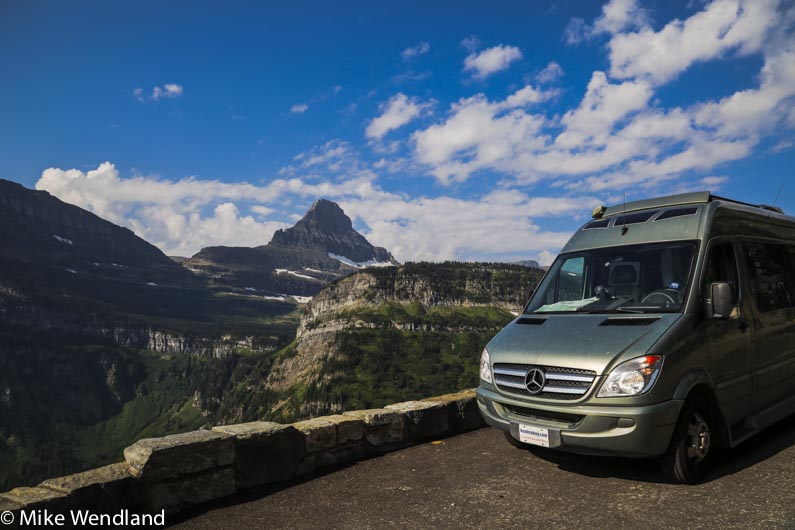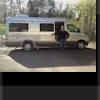More RV Lessons from the Road
 Since I released the post on the 10 lessons we’ve learned in our 75,000 miles of RV travel, several readers have asked for another installment.
Since I released the post on the 10 lessons we’ve learned in our 75,000 miles of RV travel, several readers have asked for another installment.
So here it is. This one, though, has 12 things we’ve learned from the road.
1) GPS units are all unreliable – If you rely totally on GPS to get you somewhere, sooner or later you’re going to miss your mark and be lost. In my role as a tech reporter for NBC affiliates, I’ve tried them all – Garmin, Magellan, TomTom, Rand McNally, the GPS apps, Google, Verizon, the GPS apps offered on Android and Apple devices and, of course, the built-in Clarion system that came with our Roadtrek Etrek. They all fail. They all are incomplete. Maps differ between them and there are GPS dead spots. A GPS transceiver needs at least four satellites to get any kind of a fix. Even on flat ground with a clear line of sight there can be dead spots. In order for your GPS transceiver to detect a satellite, the signal from the given satellite must be strong enough for the transceiver to pick it out of all the background noise. According to the website Richard’s Mobile Blog, the way the GPS transceiver detects a signal is by detecting phase shifts in the satellite signals. Too many satellite signals canceling out or distorting or too similar to each other will make it hard for the transceiver to know what satellite is what. So, the transceiver just gives up as if there were no satellites were there. The solution: Carry paper maps. We have a shoebox full of state maps. We now use them more and more.
2) You really can overnight in a rest area – Well, at least you can if you don’t set up camp early in the afternoon, put out the lawn chairs and string those obnoxious twinkle lights that some RVers insist on using outside their rigs. Rest areas are to rest. Pulling in after dark and leaving in the morning after a night’s sleep is not going to get you in trouble, unless you make it look like you are spending the weekend. It helps being in a Class B.
3) Stay away from trucks when overnighting – Whether a Wal-Mart or a rest area, steer clear of trucks. They run their engines all night long. They pollute everything around them. They are noisy. On a lonely stretch of US Route 212 in Montana, we looked in vain for a national or state campground one night this summer. There were none. Most of the area belonged to the Crow and then the Cheyenne Indian Reservations. Finally, about 11 PM near the town of Broadus, we found a state rest area and turned in. We even saw another Roadtrek parked there, along with a handful of trucks. We awoke at 1:30 AM to the sound of rumbling engines and the smell of diesel fumes. The place was bathed in light. Besides running their engines, many trucks keep their lights on. Every inch of space was taken up by trucks. There was no more sleep. We left and drove all the way through into South Dakota, finally finding a KOA near Spearfish a little after 3 AM. It was not a good night. We’ve had variations of that experience at many a Wal-Mart and now know… stay away from trucks.
4) We do not need campground electricity – In fact, with our Roadtrek Etrek and those eight coach batteries, the 250-watt solar panels that keep them topped off and the 5,000-watt inverter, we actually have more power in the unit than we do from plugging into a campground’s 30-amp service. So unless I will be running the power-hungry air conditioner for 12 hours straight, we seldom plug in these days. There’s no need to.
5) Campground Wi-Fi is a joke – Don’t even bother. Unless you are the only campers around. Otherwise, the guy three units down streaming Netflix videos has gobbled up all the bandwidth. Campground Wi-Fi is shared. That means s-l-o-w. We carry our own Verizon Mi-Fi data card to create our own network. But maybe I should quit talking about that. Because we noticed this year that in many a campground, so many other people are now doing the same thing, that often even the cell service is so maxed out it is almost as slow as campground Wi-Fi. See why we like boondocking?
6) Fall is the best time to hit the road – The RV boom has its down side. This was a very busy summer. Crowds at campgrounds and national parks were overwhelming. The absolute best time to hit the road is mid-September. Just about everywhere has great weather this time of year. In the north, fall colors are starting. In the south, the sniffling heat of the summer months has eased and the snowbirds have yet to arrive. Nights are cool and comfortable. Next year, we will plan our long trip from September through November.
7) Winter is also a great time to RV – I am always amazed at how many people reject winter camping. I’m not talking about heading to Florida or Arizona. I’m talking abut Northern Minnesota or Michigan’s Upper Peninsula. Winter wonderland comping. We always do a winter trip. This year, it will be to Michigan’s UP and Tahquamenon Falls State Park, where the DNR always keeps a few spots plowed. The only thing different about winter camping s that you keep your heater running all the time and you flush the toilet with antifreeze. You take bottled water because the pipes in your RV are winterized. But the scenery is spectacular. If you dress warm, hiking or snow shoeing or cross country skiing are great. And sitting around a blazing fire with two feet of snow on the ground is awesome. Oh yeah, the stars are brighter in the winter, too.
8) Pay your bills online – We have now enrolled for automatic and/or online bill paying for all our credit cards, our sticks and bricks house utilities and are able to handle our personal and household finances from the road as easily as when we were at home. We’ve learned that every bank will let you draw cash on a credit card. We use one designated credit card for all food, fuel, campgrounds and traveling expenses. This gives us a detailed record of our spending that we can use for budgeting and planning and we don’t have to worry about carrying lots of cash.
9) Join a national health club chain – You need to work out. You really do. Walking around the campground is not working out. We picked a national chain – Anytime Fitness. We have found places all across the country and really love this chain because they have very nice, clean and private bathrooms and showers. We also belong to the YMCA, which has branches across the country. Every other day, we try to plan our overnight stops in cities that have places to work out. This is Jennifer’s hard and fast rule. She gets very cranky when she misses more than a couple days of working out and I have learned, well… happy wife, happy life.
10) The RV lifestyle can be very unhealthy – Related to the above is something I hate to say but I think it needs saying. So I will. Food and drink consumption need to be controlled. We spent a week this past year on a very nice campground (I won’t say where) in which every day was themed to some event that involved alcohol. It started with Sippin’ Sunday, Margarita Mondays, Tipsy Tuesdays, Wild and Wet Wednesdays and so on and on. There were parties and happy hours every night and the place, made up mostly of seasonal RV residents, seemed to be stuck in the Sixties. The music around the pool played non-stop oldies and it was like these seniors were on perpetual spring breaks. It would have been amusing if it were not so sad. There were people whizzing by in golf carts that should have been pulled over for DUI. The only good thing was these were, after all, seniors, and by 9 PM, they had all gone to bed. We’ve seen this in different degrees at other places and have had other RVers tell us they have noticed the same thing, too. So there. I said it. Lets move on.
11) Staying connected online with RVing friends – I am amazed at the friends we have made from the road and online and how easy it is to stay in touch with them and feel connected through our Facebook Roadtreking Group. Many of us have met in person across the country on various trips. We communicate daily through this group. We have planned our own very low-keyed rallies and have asked questions and received help and we kid each other, encourage each other and are inspired by each other – just as friends do. When we travel, we share photos and its like we’re all traveling together. W e are all very different people individually, but we’re bound together by our love of RV travel and have created a community that is simply amazing. Who’d think such friendships could develop online?
12) Re-Read the RV manual – When we first got our RV, we devoured everything we could about it. I remember staying up all one night, like till 3:30 AM reading every manual back to back. Then I put them away. Early this summer, I sat around under the Etrek’s awning on glorious June day overlooking a Cape Cod beach and re-read the manual and learned stuff that either didn’t register the first time or that I totally missed. If your RV is a Roadtrek, you can download the latest manuals here. If it’s not, dig out whatever you got when you purchased it and keep it handy. I have downloaded our manual, printed it out and keep another copy electronically on my laptop. I may never be a mechanical expert like Campskunk but the manual at least gives me the confidence to know what I should be doing. If not, I can always ask Campskunk and other on the Facebook Group.
Wow. That’s 12 more lessons. Added to the first 10, that’s 22 lessons.
I think there’s still more I could do.
Later. Maybe.



0 Comments
Recommended Comments
There are no comments to display.
Please sign in to comment
You will be able to leave a comment after signing in
Sign In Now